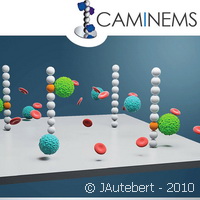Getting to cancer faster
Cancer causes around 13 % of all deaths in the world and thus represents a huge problem in public health. Every family in Europe is touched in some ways by this devastating disease. The problem is, that cancer is not just one disease, but over 200 different types of diseases, ranging from the big cancer killers to rarer conditions such as multiple myeloma and chronic myeloid leukaemia. Today, around 90 % of cancer deaths are due to metastases and therapeutic escape. Although great advances continue to be made in research and treatment, cancer remains a key health concern. However, the EU has taken action on various fronts to save lives and improve cancer survivors' quality of life. The EU funded project Integrated MicroNano-Opto Fluidic systems for high-content-diagnosis and studies of rare cancer cells (CAMINEMS) is an innovative tool that is able to perform perform a detailed molecular characterization on Circulating Tumour Cells (CTC) as a liquid biopsyproviding information on known or unknown metastases. The project was funded under the EU's Seventh Framework Programme (FP7) for EUR 3.5 million, which gathered 9 partners, technologist and clinicians from 5 European countries. At the origin of metastases are Circulating Tumour Cells (CTC), individual cells or small cellular issued from the primary cancer, and transiently circulated in the blood. The idea is to be able to perform a detailed molecular characterisation on CTC before they develop into metastases. Besides this major diagnosis and prognosis application, being able to capture and to study CTC is a highly valuable in research, for understanding their metabolism, and their response to existing or candidate drugs. For all these applications, current technologies are insufficient both in sensitivity and specificity. They can detect micro metastases only in patients with advanced cancer, and they only allow the identification of a few biomarkers. Providing a tool for overcoming these limitations, based on innovations in converging sciences, was the main objective of the CAMINEMS project. CAMINEMS developed a high sensitivity generation system and high resolution imaging system which proved to yield results beyond expectations. The system was first validated on the characterisation of lymphoma which proved capture efficiency up to 90.6% for cell quantity and as low as 50 cells per sample, which is the best result worldwide. The results provided by the project allows for routine quantitative genetic testing by direct in situ Fluorescence hybridisation (FISH) of the captured CTC, in a much less labor-intensive and with a higher success rate than currently achieved by state of the art methods. The result of the project has now initiated future industrial exploitation.For more information, please visit: CAMINEMS http://www.caminems.eu/

